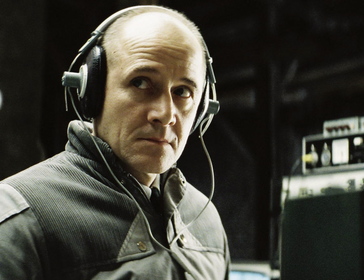A LETTER FROM THE EDITOR
"Film Critics are not intended to be applause meters. Just as restaurant critics don't send couples seeking that special anniversary meal to McDonald's on the 'everybody goes there, it must be the best' theory. The overall mandate of critics must be to point out the existence and importance of other criteria for judgment besides popularity."
- Kenneth Turan, L.A. Times film critic."The mind has triumphed over matter and the pictures roll on with the ease of musical tones. It is a superb enjoyment which no other art can furnish us."
- Hugo Munsterberg, "The Function of the Photoplay," 1916.
So, film criticism. What is the point? In this annual film issue of Big RED & Shiny we take a look at cinema. At times we do this with a intellectual leaning and sometimes with the arch tone of the easily offended but we always do this with an eye towards those bombastic Hollywood juggernauts thrust upon us earlier and earlier every year. The summer brings warm weather and the inevitable onslaught of mediocrity thinly veiled in exuberant explosions. This is not to say that there aren't films of this variety that aren't entertaining. Hellboy II: The Golden Army was certainly enjoyable and visually stunning but coherent, engaging and thought provoking it was not. Batman: The Dark Night was a far more complex film ($150 million well spent) that made several attempts to reflect and comment on contemporary American society and did this moderately well if only in a slightly heavy-handed manner. It struck all the right chords about morality and our current culture's struggle to define what it means to be good or evil. Both films have done well despite the criticism. They are being seen by millions of people. The Dark Night is well on its way to success of Titanic proportions. So then what is the point of being critical of a film (or rather looking at the film critically) when it really doesn't have an effect on a film's finances or cultural weight? Here I defer to Mr. Turan. We are here to "point out the existence and importance of other criteria for judgment." And at Big RED & Shiny we do it with the same eye that we bring to the art world.
What I am finding fascinating about this whole process (as this is my first time participating in Big RED's annual film issue) is that these are the films that I tend to ignore. In early spring I troll through film fan sites and catch as many film trailers as I can, eagerly anticipating the coming summer's offerings of explosions, big names, and Hollywood excess. I make a note of opening days and the number of screens that each film will project on (the fascinating thing is the amount of detail one can now extract about a films release. How many screens, what the marketing budget is, which actor/director will be trotted out to the various media outlets is available for consumption). It distracts me from the 20 or 30 papers on heroism in the films of Charlie Chaplin that I'm stuck reading. I lose myself in the bright colors and breakneck edits that trailers are notable for. It is eye candy in the midst of my Ozu, Welles, and Hitchcock-ian worlds. However, once summer and these blockbusters arrive I can't seem to find the time to head to the cinema to watch them. The lag time between the theatre and Cable OnDemand has gotten so short that within a few months I'll be able to see these films from the comfort of my living room so why experience them in a room full of people? This year was different. The Big RED & Shiny film issue demanded that I see these films in their native environment. And so off I went.
It is easy to forget just how experiential the cinematic experience can be. Theatres have become grand spaces with expansive lobbies and miles of snack counters doling out virtually every possible edible item known to man. The chairs are not the hard pressboard covered in a thin veneer of molded foam type that can be found in every university classroom where one is inevitably asked to sit to watch a three-hour Swedish epic. A minute of celluloid for every chiropractic visit you'll need by the end of the semester. These are actually comfortable and they even have holder for your gargantuan beverage. It is quite a different experience. But beyond the comfort level the filmic experience is unchanged in the hundred and fifteen or so years that cinema has been with us. It is about being transported to some other time, place or state of mind through the passage of images before one's eyes. It is about the combination of narrative, plot, characterization and imagery that serve to enlighten, engage, elucidate, enrage, horrify and sometimes stultify. And it is about experiencing all of these in the company of other people.
In this "experiencing moment" you realize how the film plays out for the audience. You witness just how the film is supposed to reach the viewer in a visceral way, not in the intellectual space of a film class. There is a very different level of engagement when sitting in a public theatre and watching the film communally. Granted, in Boston, there are probably more then a few people sitting there who have taken a film studies class and are trained in reading films or are armchair critics themselves that the usual theatre. But a surprising number of people check their intelligence at the door and really are there for a visceral experience that takes them away from the mundane realities of everyday life. I understand this. I realize that there is a certain amount of enjoyment in disengaging from the intellectual. I sit there basking in the glow of the numerous explosions and admiring the skill inherent in the CGI (having sat at a computer for many hours attempting to create those very same illusions myself). Then I begin to spot the gaps in plot and the weak characterizations and the mediocre acting. Suddenly I am out of the moment. I am now experiencing the film critically. I say to myself, "but wait, what about?" and "now just why are they doing that?" I am now longer the audience; I am the critic.
I feel like I am being confessional here: "my name is James and I am a film critic." I have always been the type to gripe about a film's poor construction to the point where people no longer wanted to watch films with me. I point out where the director ripped off some obscure French film or complain about how their grand metaphor about culture really doesn't hold up to serious examination. Things like that. My point being that I was born to critique films. I love movies but what I really love are the ones that make me forget I'm watching something fake and constructed. These are the films that suck you in with depth of character, invisible camerawork and complicated cultural analysis (right now I am thinking of F.H.von Donnersmarck' stunning film The Lives of Others). There are films you enjoy and films that transport. People will disagree with me. They often do. But the least that I can hope for is to get them to think about the film in a different manner. To think "why yes, it was odd that the Joker, The Dark Night's main antagonist, is simply dropped from the film once he is captured. Why is that?" I have modest goals.
Ultimately I think of Kenneth Turin again and his article "How a Film Critic Can't Go Wrong" where he states:
What criticism offers, ideally, is informed, thoughtful, well-written opinion, an expression of personal taste based on knowledge, experience and insight that helps readers both decide what to see and understand what they have seen. And the closest I've come to making a mistake has been when I haven't trusted my own instincts about a film.
I believe the key phrase here is "expression of personal taste." Film is a subjective experience. We bring our respective histories and knowledge to the theatres. We engage in the cinematic in a manner exclusively our own. While there is a certain degree of "narrative consensus," to paraphrase David Thorburn, in these moments we are more likely to relate to the film in a highly personal way. We all look at films along two (not mutually exclusive) separate tracks: 1. How it relates to us, and 2. How it relates to our previous experiences with the media. We know what to look for and expect based upon every previously viewed moving serial of images. We have all learned how to experience films based upon our indoctrination in how the moving picture functions with regards to plot, editing and acting. The key is to find the balance between these two modes and evaluating it, and qualifying it in light of all other filmic experiences. Then writing about it. Sounds easy, right?
THE FOURTH ANNUAL SUMMER MOVIE EXTRAVAGANZA by BIG RED in issue #67
SUMMER MOVIE EXTRAVAGANZA III by BIG RED in issue #45
2ND ANNUAL SUMMER MOVIE EXTRAVAGANZA by BIG RED in issue #25
SUMMER MOVIE EXTRAVAGANZA by BIG RED in issue #10





